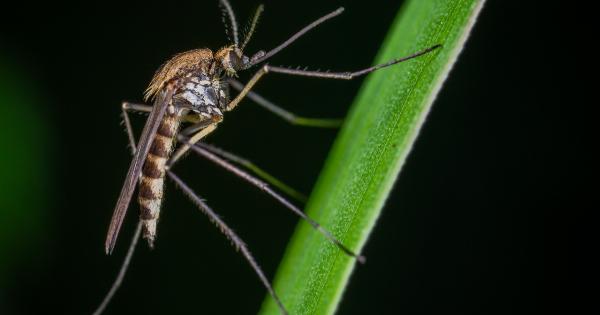Mosquitoes are not just annoying pests that buzz around and leave itchy bites on your skin. They can also carry dangerous diseases such as West Nile Virus.
Protecting yourself from mosquito bites and the potential risks associated with them is crucial for your health and well-being. In this article, we will explore various tips and strategies to stay safe from mosquitoes and reduce the chance of contracting West Nile Infection.
Understanding West Nile Virus
West Nile Virus (WNV) is a viral infection transmitted to humans through the bite of infected mosquitoes. While most people infected with WNV show no symptoms, some may develop mild flu-like symptoms.
In severe cases, it can lead to neurological disorders and, in rare instances, even death. It is essential to take necessary precautions to prevent mosquito bites and reduce the risk of infection.
1. Eliminate Mosquito Breeding Sites
The first step in controlling mosquitoes is to eliminate their breeding sites. Mosquitoes lay their eggs in standing water, so it is crucial to remove or regularly empty any containers that hold water around your home.
This includes flowerpots, buckets, old tires, bird baths, and clogged gutters. Drain or treat any stagnant water sources to prevent mosquito larvae from maturing into adults.
2. Use Mosquito Repellents
Using mosquito repellents is an effective way to protect yourself from mosquito bites. Look for repellents that contain DEET (N,N-diethyl-meta-toluamide), picaridin, or oil of lemon eucalyptus as their active ingredients.
Apply the repellent according to the instructions on the label and reapply as necessary, especially if you are spending an extended time outdoors or if you have sweat heavily.
3. Wear Protective Clothing
When outdoors in mosquito-prone areas, wearing long-sleeved shirts, long pants, and socks can provide an additional layer of protection against mosquito bites. Opt for light-colored clothing, as mosquitoes are attracted to dark colors.
Consider treating your clothing with permethrin, an insect repellent that stays effective even after multiple washes.
4. Use Mosquito Nets
Using mosquito nets over your bed, especially if you live in an area where mosquitoes are prevalent, can create a physical barrier between you and the mosquitoes.
Make sure the nets are properly tucked in and do not have any gaps or holes that mosquitoes can get through. This is particularly important if you have infants or young children who are unable to protect themselves effectively.
5. Avoid Peak Mosquito Activity
Mosquitoes are most active during dawn and dusk, and they tend to thrive in humid and warm environments. To minimize your risk of being bitten, try to avoid spending time outdoors during these peak mosquito activity periods.
If it is unavoidable, take extra preventive measures such as wearing repellents and protective clothing.
6. Keep Doors and Windows Screened
Ensure that your home is protected from mosquitoes by installing screens on doors and windows. Make sure the screens are in good condition without any tears or holes that mosquitoes can squeeze through.
Repair or replace any damaged screens promptly to prevent mosquitoes from entering your living spaces and potentially transmitting diseases.
7. Use Mosquito Traps
Mosquito traps can be helpful in reducing the number of mosquitoes in your immediate vicinity. There are various types of traps available, including those that emit carbon dioxide to attract mosquitoes and then trap them.
These traps can be particularly useful if you have a mosquito problem in your backyard or garden. Follow the manufacturer’s instructions for effective use.
8. Optimize Your Outdoor Environment
Make your outdoor environment less attractive to mosquitoes by eliminating potential resting spots. Keep the grass and vegetation in your yard trimmed regularly. Remove any yard waste or debris that may hold stagnant water.
Consider using outdoor fans, as mosquitoes are weak fliers and the breeze created by the fans can deter them from landing on you.
9. Be Aware of Travel Risks
If you are traveling to regions known for high mosquito populations or outbreaks of West Nile Virus, it is crucial to take extra precautions.
Research the area beforehand, use appropriate repellents, and consider staying in accommodations with screened windows or air conditioning. It is also advisable to wear long clothing and use bed nets while sleeping.
10. Educate Yourself and Others
Stay informed about West Nile Virus and mosquito-borne diseases. Educate yourself, your family, and your community about the risks and preventive measures associated with mosquitoes.
Encourage others to follow the best practices to reduce the transmission of West Nile Virus and protect themselves from mosquito bites.
Conclusion
Preventing mosquito bites and minimizing the risk of West Nile Infection is a responsibility we should all take seriously.
By following these tips and adopting preventive measures, you can significantly reduce your chances of encountering mosquitoes and the potential health risks associated with them. Stay safe, stay informed, and create a mosquito-free environment for yourself and your loved ones.




























